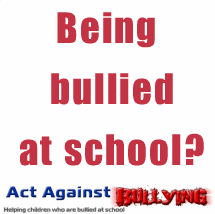
The Gordon Brown ‘bullying’ scandal highlights several aspects of today’s society. Firstly, that the problem of bullying is widespread. Secondly, and more optimistically, that it is now viewed with distaste by the general public. Otherwise Mr. Brown would not go to such great lengths as to refute it.
The reason for this is clear. Bullying behaviour is no longer considered either socially acceptable, or a suitable trait of leadership.
The third issue this saga raises is an awareness of the difficulties that victims of bullying face. If the sum total of all the top ministers running our country is unable to calm a raging boss, then what encouragement is there for the tea-lady in a local packaging factory?
Act Against Bullying is concerned with the effects on children, but the principles are very much the same. It was set up to help young people who are bullied at school by raising awareness of the harmful long term effects of systematic, harmful intimidation.
However, it’s not easy. We can’t fool ourselves. To be able to tackle the issue of bullying I think we have to accept that all human beings exhibit these characteristics in certain situations. It is sheer fantasy to imagine that we can be one hundred per cent placid and that aggression is not innate. Too many experiments have demonstrated this inconvenient fact. The important thing, I believe, is that we accept this side of ourselves, so that, in doing so, we can control it.
The fact is too that we revere powerful people, we fear them. It’s our natural instinct. So while Gordon Brown’s behaviour—as reported in Andrew Rawnsley’s book The End of the Party—sounds most unpleasant, there would not be a CEO in the country who would not have noticed the hypersensitive behaviour of his or her staff the moment he or she shows up at the office. This is why effective leaders are so aware of their outward behaviour at all times, and why we are all slightly dismayed by the accounts of life at number 10.
How do we deal with bullying though? Taking these above pointers into account, that humans harbour aggression (probably an evolutionary advantage) and uncontrolled outbursts of temper not only do damage to ourselves (our reputations, our health and self confidence) as well as to others. (Bullying accounts for anything up to twenty suicides of children under sixteen in this country alone a year) .
Well that’s why charities like
Act Against Bullying is so important. Not only do we highlight this important issue to keep it in the news, we actively promote campaigns to counteract the sort of behaviour which leads to scenarios like this one.
Our
Cool to be Kind campaign has been running now for ten years. Basically it is a way of promoting the importance of consideration for others and, if you like, basic good manners. Altruism is not only essential for children to learn and practice, it teaches good habits. In fact kind manners are the antithesis of bullying behaviour and that is why they should be actively enforced.
The sister campaign we are running at present is CyberKind which is our initiative to counter cyberbullying. Researchers of compassion have uncovered that by actively thinking, discussing and practicing kind deeds, there is a positive, knock-on effect. People generally feel better about themselves when they do something for other people that is nice as opposed to nasty. Plus if they feel better, they behave better. And so it goes.
Maybe Mr. Brown could make amends to his tormented staff by holding a
Cool to be Kind Day at Downing Street?
It is hugely important, particularly as we live in a high-pressure society where people are expected to manage so many tasks simultaneously, and particular during this ‘celebrity era’ when everything is photographed and forwarded straight away to Facebook that we consciously do everything we can to act against bullying. It is what a civilised society is all about.
After all, we are all only human.
 The Gordon Brown ‘bullying’ scandal highlights several aspects of today’s society. Firstly, that the problem of bullying is widespread. Secondly, and more optimistically, that it is now viewed with distaste by the general public. Otherwise Mr. Brown would not go to such great lengths as to refute it.
The Gordon Brown ‘bullying’ scandal highlights several aspects of today’s society. Firstly, that the problem of bullying is widespread. Secondly, and more optimistically, that it is now viewed with distaste by the general public. Otherwise Mr. Brown would not go to such great lengths as to refute it. 






